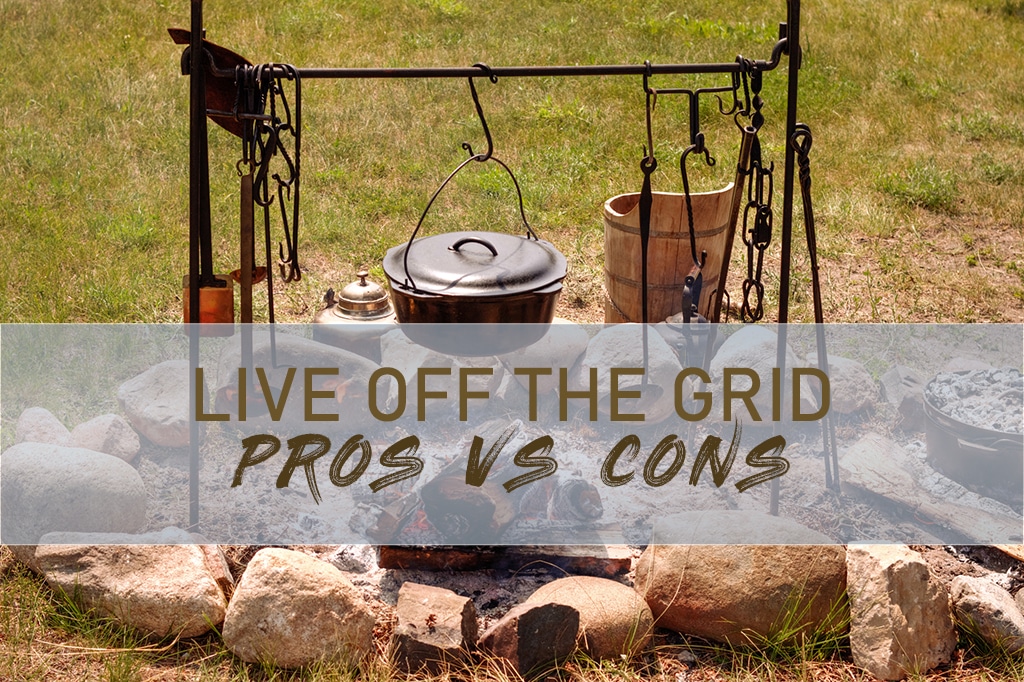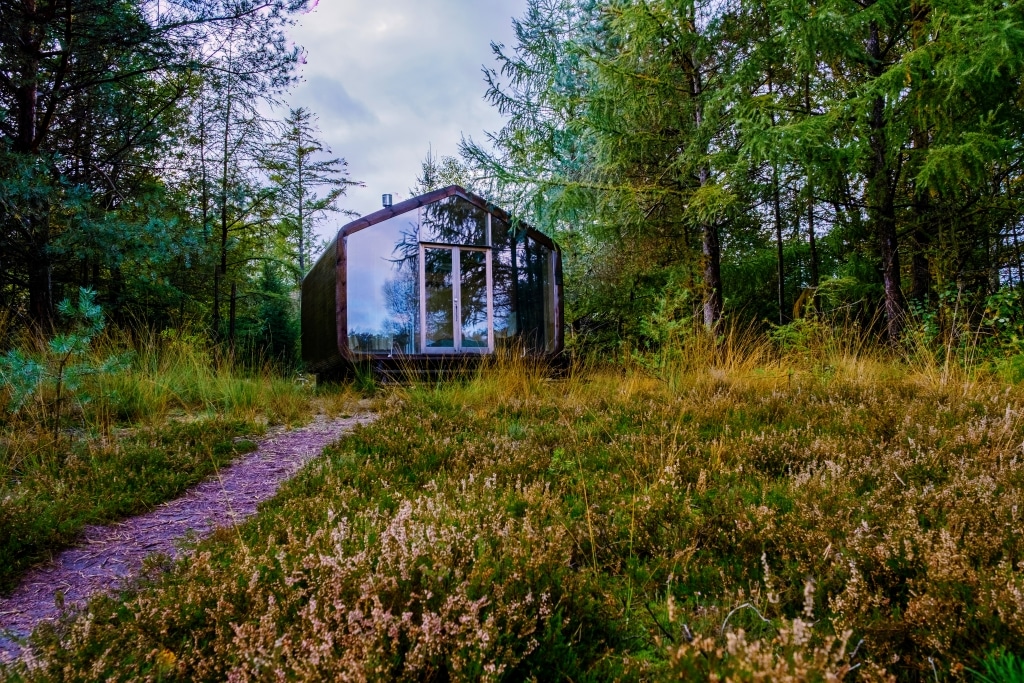
Living off the grid is a lifestyle choice that has multiple benefits. Some people choose to live off the grid for environmental reasons, for health, or simply a dream to have a carefree life.
Many people live off the grid because it is a way to be the boss of their life. They are not dependent on a job, wages, or other sources of income.
If you’ve ever thought about living off the grid, now is the time to act.
A lot of people don’t realize that they can live off the grid if they have the right knowledge and mindset. But it’s easy to get overwhelmed when you first start planning your homestead.
There are many things to consider before making this major change in your life. Let’s take a look at the pros and cons of living off the grid and whether you should go all-in or not.
Table of Contents
Why Live the Grid Life?
Living off the grid is a way of life, but can also be an extremely complicated endeavor. There are many reasons why people live off the grid, and while many people enjoy the benefits, there are also a lot of disadvantages.
And while it is possible to live off the grid without much trouble, it’s important to understand that you will need to invest a lot of time and money to make it happen. But once it does, you will reap the rewards of a simpler and greener lifestyle.
Benefits of Living Off the Grid
Living off the grid is an effective way to reduce your environmental impact. We have done extensive research and compiled a list of benefits of living off the grid.
If you’re thinking about moving to a rural area, or if you already live off the grid, you’ll probably be wondering what the advantages of living off the grid are. Some of the advantages are considered to be greater than others. So, go through them and see if it relates to you.
Here are a few benefits of off-grid living:
Freedom
It’s almost impossible to explain to someone who hasn’t tried it just how liberating off-grid living is. I’ve spent my whole life working, paying bills, commuting, shopping, doing chores, and just getting through the day.
When I finally decided to go off the grid, it was like I’d been given a gift. I had more time to myself, and I no longer had to spend my days doing unfulfilling and tedious things. This would be a good idea to pick up hobbies that you have been longing to do.
Save on Utility Bills
Another advantage of living off the grid is that you will no longer have to rely on the power company for your electricity. Instead, you can harness whatever energy you want.
You can use solar panels to generate power, or you can even set up a few small wind turbines. If you have a stream or river nearby, a micro-hydro system is also possible. Either way, you will be able to generate your electricity.
Self-Sufficiency
When you live off the grid, you can provide for yourself. You are no longer reliant on anyone else as you grow your food, raise your animals, and build your shelter.
Furthermore, you don’t need to rely on a central power company to provide your energy; you can generate your renewable energy and power your home with your own resources.
Reduce Carbon Footprint
Another benefit of going off the grid is that you can reduce your carbon footprint. You will not have to rely on fossil fuels to keep your home heated or cooled, and you will be able to reduce your reliance on the grid.
There are great benefits of using renewable energy as well as building a rainwater collection system, both of which are good to have for a sustainable lifestyle.
Less Noise and Pollution
Getting out of the urban areas, you won’t be experiencing traffic and the hectic city noise, you won’t be experiencing crazy jams and car horns when you’re sleeping!
All of these things make for a much more self-sufficient lifestyle.

Drawbacks of Living Off the Grid
Living off-grid does also have its drawbacks, particularly if you are a novice to off-grid living. Consider this a totally different lifestyle, which not everyone enjoys and appreciates it.
The main drawback of living off-grid is that you have to do more of your maintenance on your own instead of relying on others.
You will also need access to reliable energy sources, be it connecting to the grid or other renewable sources. All these have to be well-planned out. Of course, there are always two sides to every story.
Everyone’s perspective of the off-grid lifestyle will be different and sometimes, the disadvantage outweighs the advantage. Why not be the judge of that after going through the cons.
High Initial Cost
There are a lot of upfront costs associated with living off the grid, especially if you want a luxurious home that runs fully on renewable energy. You also have to purchase the right tools, materials, and know-how to construct and maintain your home properly.
And of course, there are ongoing costs, such as fuel, repairs, and maintenance.
If you are on a budget you can also check out this article to start your off-grid journey with little to no money.
Lack of Social Life
It can be hard to meet people if you live in a remote location. In order to socialize with friends and family, you will have to travel to another location outside of your home which at times can be inconvenient.
You may even miss out on events that are happening, such as community gatherings, festivals, and sports events because of accessibility inconvenience.
Must be Self-Reliant in Case of Emergencies
Emergencies personnel may have a hard time reaching you depending on the location you are living in.
They may not be able to reach you because of a lack of roads or because of weather conditions that make it difficult for them to travel. And to prepare for an emergency, you need to learn first aid, survival skills, and basic mechanics.
Pick Up Basic Skills
You will need to know how to repair your home and appliances, and also be able to provide your food, water, and shelter. You need to have proper planning for the tough initial planning since you will be doing everything yourself.
Managing livestock will also require a lot of time and effort. You will have to learn how to properly take care of your animals, including the proper way to feed them, clean their pens, and manage their reproduction.
Zoning Laws & Permits on Off-Grid Living
Zoning laws can create some challenges when it comes to living off-grid. You may not be able to build your home, garden, or other structures in the way that you want.
These laws are usually based on the type of property and the size and shape of the building. They also consider how the property is used. For example, zoning laws can allow homes to be built in a certain spot, but they may restrict the intended use of land (residential, commercial, etc).
Lacking Accessibility
At times in need, you do not have easy access to the vast number of utilities that are available in cities and towns.
You will need to choose an area where you can easily access services and supplies in case of any emergency or urgent repairs.
Water Supply
Water can become an issue when you are living off-grid. The water supply can be damaged by several factors.
For example, animals can dig up the ground and cause damage to the water supply. You may also need to fix damaged pipes or water tanks.
Ensuring you have a constant flow of water as well as properly storing the water is a must.
You may also need to build and maintain an adequate water supply system to ensure that you have enough water when it’s needed.
Power Generation System
Off-grid living can be difficult, especially if there are no power lines nearby. You will need a huge battery bank for your solar panels or use generators instead of relying on electricity from the grid.
It can also become a challenge in maintaining the electrical system in your home in case of power outage.
Final Note
Going off the grid can be a very rewarding experience. You can feel self-sufficient, and you can take control of your life. However, there are also a lot of benefits to going off the grid, and you need to weigh them against the drawbacks.
If you are going to live off the grid, make sure that you are willing to make the necessary initial investments, and that you are willing to learn basic skills to live a sustainable lifestyle.
This can help ease some concerns about living off the grid, so you can focus on preparation for any eventuality and avoid some of the problems that you may encounter when you are living off the grid.

